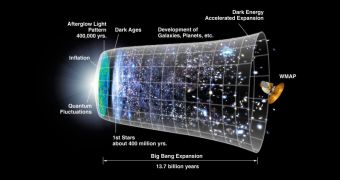In the 1930, a cosmological theory was proposed and everyone thought it was too crazy to be true. It took almost eight decades for a group of scientists to finally prove that the theory is true, thus making one of the greatest space discoveries.
$500,000 and the Gruber Cosmology Prize represent the reward for the discovery and confirmation of the fact that the Universe is expanding at an accelerating speed. In the past years, "new techniques that use supernovae exploding within distant galaxies to measure precise distances across a large fraction of the observable Universe," made a team of astronomers safely conclude that the Universe's expansion is constantly accelerating.
"I was amazed when I stared at the graph we had just drawn. We had set out to measure the deceleration of the universe, and found it was accelerating. This was one of the eureka moments I have been privileged to observe," said team member Gerson Goldhaber, physicist at the Berkeley Lab's Physics Division.
This discovery is now being recognized by the Gruber Foundation, which awarded the Peter and Patricia Gruber Foundation Cosmology Prize in collaboration with the International Astronomical Union. In addition to getting the well-deserved consideration and respect of their colleagues, the $500,000 prize is but a small payoff for an eight-year long collaborative project.
"Today's recognition by the Gruber Foundation is deeply gratifying," says team member and astronomer Greg Aldering, also of the Physics Division. "Collaborating in such a surprising and fundamental discovery is a reward beyond compare, and this prize serves to celebrate the thrill and import of what seemed, at the time, but a humble endeavor."
"It's so nice to have a result where you can sit down with a fifth grader and they can understand it. You don't have to teach them general relativity to explain to them how you measure distant supernovae and find out whether they are slowing down or speeding up. As for the Gruber Prize itself, it's wonderful that they are rewarding the whole team -- that's a rare thing in the world of scientific prizes," added team member and astrophysicist Peter Nugent, of the Lab's Computational Research Division.

 14 DAY TRIAL //
14 DAY TRIAL //